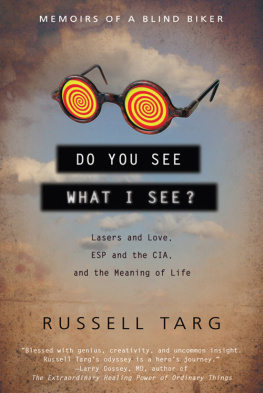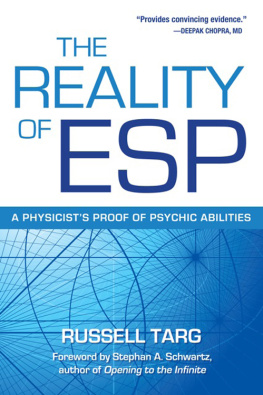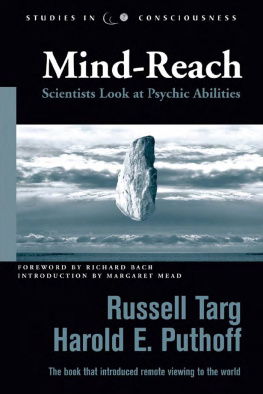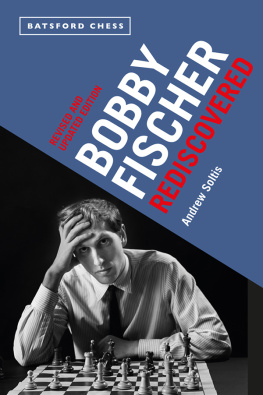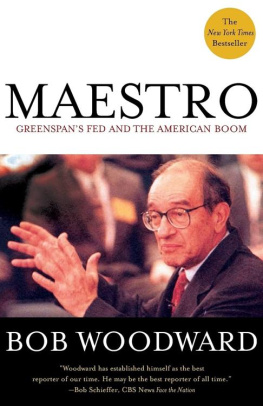
Also by Russell Targ
The End of Suffering: Fearless Living in Troubled Times
(2006, with J. J. Hurtak)
Limitless Mind: A Guide to Remote Viewing and Transformation of Consciousness
(2004)
The Heart of the Mind: How to Experience God without Belief
(1999, with Jane Katra)
Miracles of Mind: Exploring Nonlocal Consciousness and Spiritual Healing
(1998, with Jane Katra)
The Mind Race: Understanding and Using Psychic Abilities
(1984, with Keith Harary)
Mind at Large: Institute of Electrical and Electronics Engineers Symposium on the Nature of Extrasensory Perception
(1979, 2002, with Charles Tart and Harold Puthoff)
Mind Reach: Scientists Look at Psychic Ability
(1977, 2005, with Harold Puthoff)
This edition first published in 2010 by Hampton Roads Publishing Company
www.hrpub.com
Copyright 2008
by Russell Targ
All rights reserved, including the right to reproduce this work in any form whatsoever, without permission in writing from the publisher, except for brief passages in connection with a review.
Cover design by Bookwrights Design
Sketch of the author 2007 by Patricia Targ
Credit: Lady Godiva, c.1898 (oil on canvas) by John Collier (18501934)
Herbert Art Gallery & Museum, Coventry, UK
The Bridgeman Art Library
Nationality / copyright status: English / out of copyright
PLEASE NOTE: The Bridgeman Art Library works with the owner of this image to clear permission. If you wish to reproduce this image, please inform us so we can clear permission for you.
Hampton Roads Publishing Company, Inc.
www.hrpub.com
Library of Congress Cataloging-in-Publication Data for the hardcover edition
Targ, Russell.
Do you see what I see? : memoirs of a blind biker / Russell Targ.
p. cm.
Summary: The autobiography of a noted scientist who made significant contributions to the field of optics and lasers, and participated in the government's top-secret psychic spy program. Includes the author's encounters with well-known authors, actors, scientists, and other recognizable figures--Provided by publisher.
Includes bibliographical references and index.
ISBN 978-1-57174-559-0 (hc : acid-free paper)
1. Targ, Russell. 2. Physicists--United States--Biography. 3.
Parapsychologists--United States--Biography. I. Title.
QC16.T355A3 2003
530.092--dc22
[B]
2007052155
ISBN 978-1-57174-630-6
10 9 8 7 6 5 4 3 2 1
Printed on acid-free paper in Canada
For Patricia Kathleen, my life partner,
lover, companion, and dharma buddy;
and for Alexander and Nicholas,
my dear sons who are mensches
and a pride to my father's heart.
CONTENTS
What was seen as correct in one generation is realized as incorrect in the next generation. Within every generation there is a huge blind spot. When you look back at slavery, you cannot help wondering how it is possible that this horror could have occurred, and it occurred with the acceptance of good people! We have to be willing to see what is occurring in our own lives, just as horrible as slavery, that we have been blind to...
It is not that people won't betray you. It is not that your heart won't break again and again. Opening to whatever is present can be a heartbreaking business. But let the heart break, for your breaking heart only reveals a core of love unbroken.
Gangaji
Nothing can bring you peace but yourself.
Ralph Waldo Emerson Self-Reliance
FOREWORD
In 1963, with wife, daughter, newly born son, and a freshly minted degree in psychology, I left the respectable but conservative University of North Carolina in Chapel Hill and drove west toward an exciting new life in exotic California. I had a vague feeling that I would meet new and exciting peopleafter all, California was about as romantic and exotic as one could imagine to those of us who grew up on the East Coastbut little realized just how interesting some of these people would be. You're about to learn about the life of one of these people, Russell Targ. Who else do you know who can honestly joke, while being quite serious, that he found God while spying for the CIA?
And why is Russell important as well as interesting? Let me start with some historical background.
Like Russell, I had been interested in parapsychology since I was a teenager. By 1963, I was already well-read in studies of things like telepathy and clairvoyance, had conducted a couple of experiments, and occasionally visited the world-famous laboratory of Dr. Joseph Banks Rhine at Duke University, less than an hour's drive from Chapel Hill. Rhine had pioneered rigorous laboratory research into extrasensory perception (ESP), which covered telepathy, clairvoyance, and precognition, and mind-over-matter, or psychokinesis (PK). Collectively, ESP and PK are nowadays referred to as psi phenomena. When I studied this laboratory evidence, I was convinced that the case for the existence of ESP and PK was excellent, better than for many accepted mainstream phenomena, yet it was clear that many establishment scientists rejected it, and rejected it for irrational, prejudicial reasons, rather than good scientific ones.
Even before leaving for California, I was already convinced that it was pretty much a waste of time to collect more evidence to prove the existence of psi; it would just be prejudicially ignored, too. What was needed was a way of getting strong, reliable amounts of psi to manifest in the laboratory, and then we could study what affected it and how it worked. A better understanding of how it worked would lead to more progress in getting psi to happen and practically applying it. In turn, strong, reliable psi effects would bypass the problem of prejudiced scientists not paying any attention to psi effects, which would allow more research to happen, hopefully leading to better understanding. But the few scientists (parapsychologists) working on psi back then almost always found what I often termed statistically significant but practically trivial psi effects.
An analogy I started using back then and still like, particularly apt for the autobiography of a physicist like Russell, is that the study of psi was where the study of electricity had been for most of humanity's history. We had lightning strikes, powerful and spectacular, but over in the blink of an eye and therefore hard to study. This was like the occurrences of psi in everyday life, sometimes very striking but over and gone, therefore hard to study. We had static electrical effects. If you rubbed a piece of amber on some fur, sometimes it would pick up a feather and many times, for reasons not at all understood, nothing at all happened. These were our laboratory psi tests, statistically meaningful but practically teensy and often not working at all for unknown reasons.
The science of electricity took an incredible leap forward with the invention of the battery. It was way less spectacular than lightning but far more powerful than amber rubbed on fur, and it was reliable; you could work with it whenever you wanted to. Now we could study how electricity worked, what affected it and in a very short time, compared with the full scope of human history, we have a civilization run on electricity and electronics! In parapsychology, we needed a psi battery, a method to get moderately strong and reliable psi from people, then we could study it efficiently, strengthen it, and develop practical applications.
You can anticipate where I'm going with this if I describe Russell Targ as a battery development pioneer, who would soon be in my future as colleague and friend.
Next page
